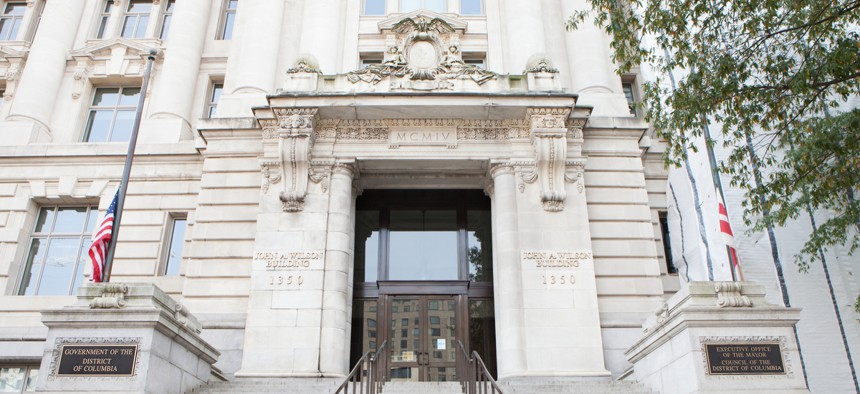Universal Basic Income Could Help Poor D.C. Residents—But It’s Risky

The Wilson Building is the seat of government for the District of Columbia. Shutterstock
The program could cost up to $9 billion a year and has the potential to put federal funding for other safety-net programs at risk, according to a policy analysis.
A universal basic income could help lift people out of poverty in Washington, D.C., but could cost up to $9 billion a year and has the potential to put federal funding for other safety-net programs at risk.
Those estimates come from a policy analysis compiled by the D.C. Council’s budget office to examine the feasibility of a universal basic income, or UBI, where residents receive regular cash payments with no strings attached.
“A minimum income program could provide the District with a new, comprehensive tool to alleviate poverty in the city,” according to the report. “Such a program would put the District at the vanguard of social safety net policy innovation. However, it would not be without risks.”
Among those risks is the possibility that the district could lose federal funding for existing programs that aim to help low-income individuals. Implementing a basic income with locally raised dollars—including a tax hike—would be “prohibitively expensive,” and could destabilize the tax base by forcing residents to move outside city limits to attain a lower cost of living.
“To collect enough revenue to support a significant minimum-income benefit, the District would likely have to raise its tax rates and in the process become a far more expensive place for wage earners to live than surrounding jurisdictions,” the analysis says.
And D.C. is already an expensive place to live. Councilmembers there attempted to address that issue in 2016 by approving a measure to raise the local minimum wage to $15 by 2020, but even that amount isn’t enough to live on without taking advantage of existing social programs.
According to the budget office analysis, a single adult without children would need an hourly wage of about $17.78 (or an annual income of $36,988) to meet basic needs, including federal and local tax payments. A single parent with one child would need to make roughly $31.79 per hour ($66,113 per year), while a single parent with two children would need an hourly wage of $46.58 ($96,885 annually).
All three of those numbers assume no assistance from safety-net programs, which could be threatened with the addition of basic income.
“A minimum income program could put much of the District’s needs-tested federal funding in jeopardy if the amount of assistance it provides to low-income residents is so great that it renders households and communities ineligible for means-tested federal supports,” the report says.
But the district could potentially offset that risk by using “locally provided refundable tax credits” to fund minimum income cash payments for low-income workers. Those “would probably not be subject [to] federal taxation or impact eligibility for needs-tested federal subsidies.”
Cost estimates for income payments vary. The lower suggested payments, designed to raise low-income residents to the federal poverty level—starting at $12,060 for individuals—would cost between $380 and $710 million each year, depending on whether the money is issued as a direct cash payment or as a tax credit.
Higher payments, designed to elevate low-income families to 450 percent of the federal poverty level—$90,405 per year for a family of three—would cost between $7 and $9.3 billion, depending on how many recipients stopped working as a result of the payment. (D.C.’s entire 2018 budget totals $7.4 billion.)
The analysis, released earlier this year, was compiled at the request of D.C. Councilmember David Grosso during the fight to raise the district’s minimum wage to $15.
Kate Elizabeth Queram is a Staff Correspondent for Government Executive’s Route Fifty and is based in Washington, D.C.
NEXT STORY: Hedge Those Bets: Sports Gambling May Not Be a Jackpot for States





